Estimated read time: 4-5 minutes
This archived news story is available only for your personal, non-commercial use. Information in the story may be outdated or superseded by additional information. Reading or replaying the story in its archived form does not constitute a republication of the story.
SALT LAKE CITY — Utah Gov. Spencer Cox's proposed budget for homelessness of $193 million fell short in the Utah Legislature, which approved $66.2 million as the session wrapped up on Friday.
The proposed allocations included $130 million for emergency shelter; $8 million for behavioral health professionals; $7 million focused on prevention, including affordable housing; $50 million for the first-time homebuying program and a $10 million one-time investment to establish a diversion court pilot program called HOME Court.
Only a fraction of each allocation, if at all, was approved by lawmakers in what has been regarded by some as a "underwear and socks" budget season. Despite approval falling short of the proposal, the governor applauded the approved budget Saturday.
"Our homeless friends need our help, and I'm grateful to live in a state where we take care of each other and our most vulnerable," Cox said in a statement. "This comprehensive approach will help keep all Utahns safe, improve our cities, counties and businesses."
The $66.2 million funding package, with an additional $15 million committed by the Utah Impact Partnership, includes:
- Emergency shelter investments of $50.7 million, with $25 million of that specifically for low-barrier shelter development; $21.8 million for statewide homeless system support; $2.5 million for homeless shelter cities mitigation; $10 million for wrap-around services; and $1.4 million for other shelter supports.
- Prevention allocation includes $2.5 million for a new HOME Court to facilitate lasting treatment outcomes for homeless individuals; $1.7 million in Temporary Assistance for Needy Families funding to support youth experiencing homelessness; and $238,000 for additional staff to support state housing programs.
- Behavioral health investments of $11.1 million include $8.2 million for a "step-down" facility for individuals with severe mental illness; $2.3 million to help address behavioral health workforce gaps; $351,200 for opioid-related supportive housing; as well as $185,000 for behavioral health licensee support.
"I am proud of the work we did this session to address unsanctioned camping, improve housing affordability, and mitigate the effects of homelessness on local communities," said House Speaker Mike Schultz, R-Hooper. "Strengthening accountability, enforcing unsanctioned camping, and establishing better processes and programs for individuals suffering from mental and behavioral health issues are big steps in the right direction."
The bare bones budget drew some criticism from homeless advocates and service providers in comparison to other allocations made by Utah lawmakers, including the approval of a $167 million income tax reduction and bills creating a pathway for a new arena for the Utah Jazz and a hoped-for National Hockey League franchise. The tax reduction would largely benefit Utah's wealthiest residents with 60% of the cut going to 20% of Utahns, according to an analysis by the Institute on Taxation and Economic Policy.
Members of the Faith and Advocacy Coalition to End Hunger and Homelessness penned a letter to lawmakers on Monday, ahead of final approval.
"Evidence of the prosperity of our state have come to light during the final weeks of the legislative session as bills have come forward to dedicate at least $60 million per year, for 30 years, to enabling the production of two new major sports venues," the letter says, in part. "A state that can afford to dedicate at least $60 million a year to two projects that are appealing, but not necessary, can also find a way to make comparable new investments in efforts to address our state's two highly-related crises of homelessness and skyrocketing housing costs."
Additionally, lawmakers declined to take up the governor's budget request to add more affordable housing.
Bills centered on homelessness headed to the governor's desk for approval include:
- HB298: Establishes a "functional-zero" approach by strengthening data accountability requirements and improved governance by reshaping the Homelessness Board.
- HB299: Strengthens Utah's civil commitment laws and amends release standards to better align care for patients suffering from mental and behavioral health issues.
- HB421: Focuses on enforcement of unsanctioned camping and establishes the HOME Court pilot program.
- HB548: Allows optional donations to the Pamela Atkinson Homeless Account.
- SB139: Establishes a process for the courts to order ongoing administration of antipsychotic medication to maintain a defendant's competency to stand trial.










